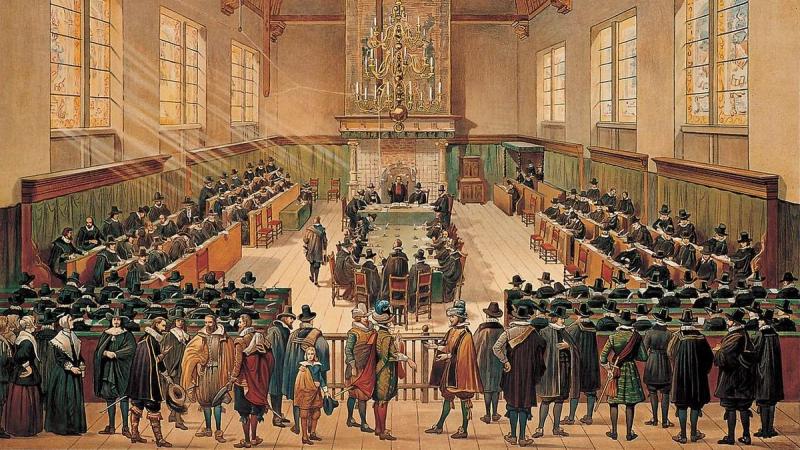In my last post, I explained some of the basic assumptions and reasons for the infra- and supralapsarian debates in the early modern period. In this post I want to give a primer on one of those basic assumptions, namely the treatment of the doctrine of predestination and reprobation in the early modern period.
Predestination and Election
The terms election and predestination are often used synonymously today, as they sometimes were in the early modern period. Yet, some Christian theologians following the lead of Thomas Aquinas (Iª q. 23 a. 4 co.) distinguished the two. The former—election—referred, as Thomas seemed to understand it, as the divine will of selecting and conferring eternal glory upon certain individuals. Thus, election is the divine will with respect to the end of certain people. Predestination, on the other hand, was defined as an act of the divine intellect (in distinction from his will) of foreknowing and directing the aforementioned elected persons to eternal life by way of infallible means (regeneration, faith, sanctification, etc.). In other words, predestination was an act of the divine intellect with respect to the means of bringing certain people to eternal life. Accordingly, Augustine claimed that “predestination of the saints is nothing other than foreknowledge and the preparation of the benefits of God, by which whoever are freed are most certainly freed.”
Negative and Positive Reprobation
When theologians spoke of reprobation—that unpleasant side of predestination, as many would call it—they employed similar distinctions. The medieval Augustinians oftentimes used the term predestination to indicate both the notion of predestination defined above and what we now typically call reprobation. For example, the Council of Valence in 855 affirmed “the predestination of the elect to life and the predestination of the ungodly to death.” By the early modern period, most preferred to limit the word predestination to the elect and used the term reprobation to refer either to the damnation of sinners, or the will of God not to give certain saving gifts to certain sinners by which they would be infallibly led to eternal life. In the latter sense, reprobation a necessary contrary truth, given the definition of predestination expounded above. If God chose to grant only certain people faith and perseverance by which they are infallibly led to eternal life, then he necessarily chose not to do this for others. This will not to give effectual grace has often been termed negative reprobation or preterition. It is a divine will, but it is, to use antiquated latinized English, a nilling. Theologians have been quick to note that in this will to not give something, God does not in any way compel the sinner to continue his or her obstinacy towards God and the gospel. Positive reprobation, distinguished from negative reprobation, was the divine will actually to damn an impenitent sinner. Positive reprobation had in view the act of damnation itself.
Predestination and Reprobation among Protestants and Roman Catholics
It might be surprising, but in terms of sheer volume, the Roman Catholics of the early modern period wrote a lot more on the doctrines of predestination and reprobation. There are many different reasons for this, but perhaps the most significant impetus was the so-called De Auxiliis controversy near the end of the 16th century. This controversy previewed the later Protestant intramural debate on predestination and grace at the Synod of Dordt in 1618/1619. Among both Roman Catholics and Protestants, there were those who emphasized the unconditional nature of predestination such as the Roman Catholic Dominicans and the Protestant Reformed. And, on the other side, there were some who, motivated by other important biblical truths, emphasized the role conditions played in the economy of soteriology, and hence denied unconditional predestination. Many Roman Catholic Jesuits, Lutherans, and Arminians tended in this latter direction.
By the 17th century, there was a significant amount of cross-pollination (as it were) among Protestants and Roman Catholics. They read each other on predestination with both commendation and criticism. Later scholastic Reformed theology was especially influenced by Roman Catholic writings on predestination and reprobation, as the latter were consistently providing the terminology and questions by which those doctrines were to be discussed and debated.
Unlike popular caricatures, early modern theologians were not obsessed with the doctrine. Notably, most early modern catechisms do not even discuss predestination. And even when confessions do discuss it, they often, as the Thirty-Nine Articles did, ignore its unpleasant side—reprobation. Both Protestants and Roman Catholics realized that the doctrine, though taught in Scripture, needed to be carefully taught; which they largely left to academic disputations and polemical works! For those interested in clear expositions of these doctrines, the scholastic Roman Catholic and Protestant treatments of the doctrine are still the best place to go.
Dr. Michael Lynch teaches language and humanities at Delaware Valley Classical School in New Castle, DE. He is the author of John Davenant’s Hypothetical Universalism (Oxford University Press, forthcoming)



